This content has been archived. It may no longer be relevant
Stuck in an all too familiar world, this adaptation of Mike Carey’s teen novel is overrun with zombie movie clichés, clunky dialogue, and character actions that would make the crew of The Prometheus seem level headed. In short, it’s like what would happen if children’s television did The Walking Dead.
In future England, one overrun by zombies, here referred to as “hungries”, Miss Justineau (Gemma Arterton) is teaching Greek mythology to a group of children. One of these pupils is Melanie (Sennia Nanua), a bright, inquisitive girl, eager to raise her hand in response to a question, and like the rest of her classmates, she’s strapped into a wheelchair, with wrist and headclamps attached, and a soldier with his gun trained on her at all times. You see, Melanie is an intelligent zombie, her predilection for flesh suppressed by a diet of mealworms and scent masking gel, existing in a cramped cell on an army base. That is until all hell breaks loose and a disparate group of survivors, including Paddy Considine’s Sergeant and Glenn Close’s head scientist, must get to a military safe zone on the other side of London.
For a film that employs the 28 Days Later style sprinting zombie as its undead model of choice, The Girl with All the Gifts doesn’t half shuffle, nay stumble along for most of its run time, and that’s mainly because it’s tripping over so many recognisable genre tropes.
It might be beautiful to look at, belying the £4m budget (Ghostbusters 2016 cost HOW MUCH?), but you soon start thinking about the I Am Legend aesthetics, which are exactly the same. Then your mind wanders to AMC’s all conquering TWD TV show, when sequences such as the tiptoe through the undead unfolds as a pale imitation. And then when you finally think the film is skewing towards something original in the final reel, and your interest is still being piqued despite the seen-it-all-before nature of proceedings, you remember that Imogen Poots’ character in 28 Weeks Later was also a girl with all the gifts thanks to her immunity.
So there’s nothing new to look at, but what about the subtext, something so intrinsically linked to the zombie genre since they were coming to get Barbara in 1968’s Night of the Living Dead? There’s what it means to really be ‘alive’, and a damning indictment on how we treat those who are different, but nothing to rival the zeitgeist capturing brilliance of the Romero classics.
The characters and those embodying them are a mixed bag; newcomer Nanua delivers her lines in a requisitely detached manner, but this can often manifest as being rather wooden. She’s a little too earnest in her facial expressions to convince as either sympathetic or scary. Glenn Close gives a healthy dose of pantomime toughness, Paddy Considine is equally gruff, given more of an arc to work with, but Gemma Arterton is completely wasted beyond the initial empathy she offers up to the zombabies.
The less said about their narrative actions, the better, but a last reel decision by Glenn Close’s doctor, and an incident involving a row of top-shelf porno mags are laughably bad examples indicative of the film as whole.
Image: Warner Bros. Pictures
Our Review
Summary
Anyone without knowledge of the comparable titles from which most of this is derived might find some enjoyment here, but that’d be hard in an entertainment landscape in which zombies are on every app, game, and TV screen out there, and in more original forms than this.


